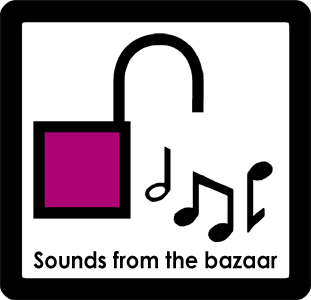As promised more on this weekends Sounds of the Bazaar LIVE internet radio fest. Don’t miss it!
The programme times are as follows:
Saturday 19 April – 1300 UK summer time, 1400 Central European Summer Time (CEST)
Sunady 20 April – 1900 UK summer time, 2000 CEST
MondaY 21 April – 1800 UK summer time, 1900 CEST
Each of the programmes, which will last about 45 minutes, has a theme.
Saturday’s programme will focus on e-Portfolios and Personal Learning Environments. And I will be talking live with Cristina Costa about how we can use social software and web 2.0 tools to support learning.
Sunday will look at creativity and reflection in learning. Programme guests include John Pallister form Wolsingham School in County Durham and Annika Matilda Bergstroem from Sweden.
And on Monday we will be looking at Web 2.0, innovation and learning development. Guests include Raymond Elferink from the Netherlands and Andreas Auwarter from the University of Koblenz in Germany. Ray will be talking about a new lightweight learning repository and Andreas about podcasting in education.
And on course we want you to take part too. You can email your questions or comments on the show to me, Graham Attwell, on graham10 [at] mac [dot] com. Or you can text me on 00491797650986. All comments that are fit to be heard will be read out LIVE. But better still come on the show. How can you do that? Just skype me – my skype name is GrahamAttwell. Make sure you have a headset ready. Or email me in advance and tell me you would like to come on the show giving me your skype address.
And on Thursday we will be launching a new project – the Emerge Bazaar (an Emerge benefits Realisation Project) as part of a JISC Emerge three day on-line event.
The launch will take the form of a one hour LIVe internet radio programme. We’ve got lots of great content lined up for you: interviews, phone ins (or, more properly, ‘skype ins’), jingles, competitions and more. Anyway, more details on that next week. Of course we will also be explaining to you what the Emerge Bazaar is about. You are all invited. This programme will be at 1600 UK Summer Time, 1700 Central European Summer Time.
Last – but not least – how do you access the show. Sound of the Bazaar will be streamed from the following address:
http://icecast.commedia.org.uk:8000/emerge.mp3.m3u
Just put this address in your browser and the stream should open in your favourite MP3 player on your computer – e.g. iTunes or Windows Media Player.
If you have any technical queries or any other questions please get in touch. Meanwhile sit back and enjoy the show.

